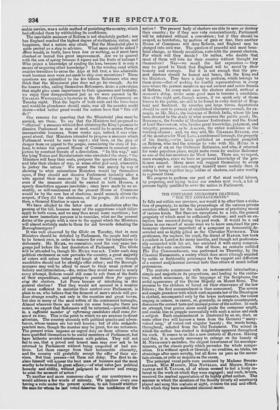THE CHEVALIER NEUKOMM'S ORATORIO,. "THE TEN COMMANDMENTS."
IT falls not within our province, nor would it be other than a viola- tion of propriety, to notice the proceedings. of the various private societies which meet for the laudable purpose of practising musie of various kinds. But there are exceptions to a rule, the general propriety of which must be sufficiently obvious ; and such an ex- ception has occurred during the past week. It would be a sad hiatus in our record of music were we to leave unnoticed the per- formance (however imperfect) of a composer so honourably de- scended and so highly gifted as the Chevalier NEUKOMAL This gentleman, the nephew, the pupil, the friend of HAYDN, has been a resident in London for many months, and though not profession- ally connected with his art, has enriched it with miny composi- tions of first-rate excellence. One of these, an oratorio entitled The Ten Commandments, was performed on Thursday, by the Classical Harmonists, a society which does more (though unaided by noble or fashionable patronage) for the support and diffusion of a correct anda'classical musical taste than others of much loftier pretensions. The oratorio commences with an instrumental introduction; simple and majestic,in its proportions, and leading to the recita- tive, which announces, in the language of the Scriptures, the awful appearance of the Divine Majesty on Mount Sinai. The promise to the children of Israel on their observance of the law follows ; the first commandment is then announced. The severe and simple grandeur with which each separate law of the Decalogue is clothed, accompanied only by the brass instruments, the voices singing in unison, in canon, or, generally, in simple counterpoint, discovers the correct taste and musical power of the author. In such an attempt, true genius alone could guide the composer aright, and enable him to grapple successfully with such a scene and such a subject. Each commandment is illustrated by an air, duet, or some other (we will borrow a term from the German) "many- voiced song," of varied and singular beauty ; the words being-, throughout, selected from the Old Testament. The school in which the author has studied is delightfully apparent throughout his work. It comes to us like a new oratorio of HAYDN. Having said this, it is scarcely necessary to enlarge on the beauty of M. NEUKOMM'S melodies, the elegant luxuriance of his accompa- niments' or the classic purity which pervades the whole compo- sition. It is without speck or blemish; no crudities, no tricks, no strainings after mere novelty, but all flows as pure as the moun- tain-stream, or rolls as majestic as the ocean. The principal voeal.parts were sustained by Madame STOCK.* HAUSEN, Miss MAssopt, Miss NovELLo, and Messrs. HORN* CASTLE and E. TAYLOR, all of whom seemed to feel a lively in- terest in the work on which they were engaged; and each, in turn, received the marked approbation of its highly gifted author. The manner in which the members of the Society (nearly all amateurs). played and sung this oratorio at sight, evinces the zeal and effect. with which they have cultivated classicalmusie.


























 Previous page
Previous page